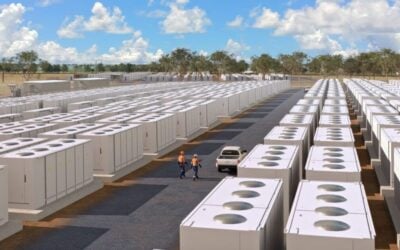Outside view of NLAB test chamber - see cars on right hand side of picture for an idea of the facility's scale. Image: Nite / NLAB.
The Japanese city in which the manufacturing bases of lithium-ion battery makers including Panasonic, Hitachi Maxcell and GS Yuasa are located will play host to the world's biggest energy storage battery and system testing facility to date.
The National Institute of Technology and Evaluation (Nite), launched by the national Ministry of Economy, Trade and Industry (METI), is preparing to begin testing large-scale batteries this summer at its recently completed NLAB facility. Located in the city of Osaka, an hour's flight from Tokyo, traditionally a strong manufacturing region, it is hoped that the centre will become integral to ongoing efforts to develop standards for the international energy storage industry.
Enjoy 12 months of exclusive analysis
- Regular insight and analysis of the industry’s biggest developments
- In-depth interviews with the industry’s leading figures
- Annual digital subscription to the PV Tech Power journal
- Discounts on Solar Media’s portfolio of events, in-person and virtual
Energy Storage News spoke with Koichi Yamamoto, a director at Nite and the Global Center for Evaluation Technology (GCET), at the Battery Expo in Tokyo this week, taking place alongside PV Expo.Yamamoto informed Energy Storage News that NLAB aims to assist the competitiveness of domestic industry, while helping to develop safety standards that could be adopted universally.
"In many ways safety standards - at this point in time - are the most important aspect of developing an energy storage industry as a whole," Yamamoto said, echoing the words of many other groups including Europe's accreditation and testing group DNV GL, which has developed a guide to grid-connecting energy storage systems, to take just one example.
"We'd like to make Japanese safety standards into the universal standards for the industry - while also boosting the competitiveness of Japanese industry."
Yamamoto and colleagues said that influential groups such as the US-based Underwriters' Laboratory are already confirmed to be using the centre for some of its standards development and going forward hope that it will be used for a majority of testing related to standardisation. In future it is likely the testing will not be limited to lithium-ion and perhaps not restricted to energy storage for the above mentioned applications.
However, energy storage for renewables and for the grid are one area where private investment alone does not seem to be able to support large-scale testing, according to Yamamoto, due to the early stage development of the economic case for them and the levels of capital investment required.
"For now, it's focused on energy storage batteries but of course, batteries are widely used in various areas. Of course for these large batteries there is a huge amount of capital investment involved, and for the private sector to support this alone is an extremely difficult thing to achieve. [But] we have been in discussion with industries from all sorts of areas already," Yamamoto said.
Under construction. Image: Nite / NLAB.
Completed testing room. Image: Nite / NLAB.
The NLAB site
The centre features a huge testing chamber, connected with a correspondingly vast air and heat exchanger system (see pictures). While it will begin with testing lithium-ion batteries for renewables and standalone large-scale energy storage applications, it will by no means be limited to this set of technologies or battery chemistries.
Yamamoto said that the city of Osaka was chosen for two reasons: firstly, the proximity of Panasonic and other manufacturers' existing operations and Osaka's background in general as a manufacturing hub. The second was that a large complex of government buildings already existed there, that were now old and didn't meet modern standards of guaranteed structural safety from seismic activity, meaning they were due to be pulled down anyway.
While public money was needed to execute the NLAB project, Yamamoto said that the work done there will contribute immediately to delivering services private companies were not able to previously provide, meaning that from day one it could start returning value and contributing to the development of a more commercialised energy storage industry, in Japan and globally. Standardisation could be key to helping unlock access to financing, for example, once long-term assurances can be provided by makers that their products are safe and will work as intended.
"We are part of METI and were founded using public funding. Private companies will be able to ask us to perform large scale testing that previously was closing off an important area of business for them. Makers need this data, public laboratories will have more work, we can connect the various areas together. The industry as a whole needs this kind of evaulation process that the test centre can provide," Yamamota said.
While NLAB will likely be the largest to date in the world, other organisations including the US National Renewable Energy Laboratory and the regional NY BEST group also have testing and development centres in place for energy storage systems.
Aerial view of complex. Not large-scale heat exchange / ventilation attached to test chamber. Image: Nite / NLAB.






